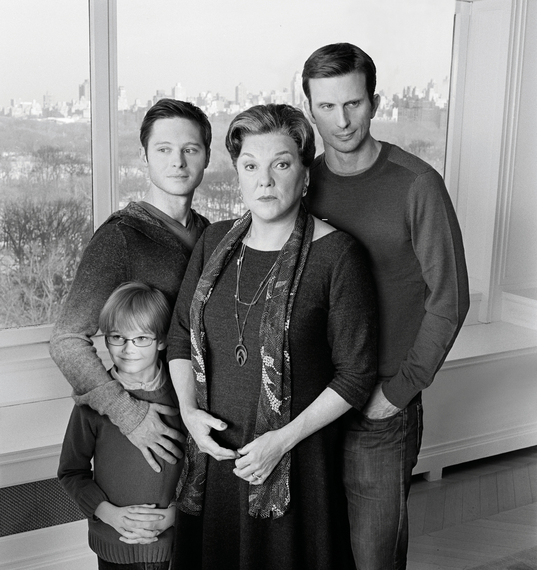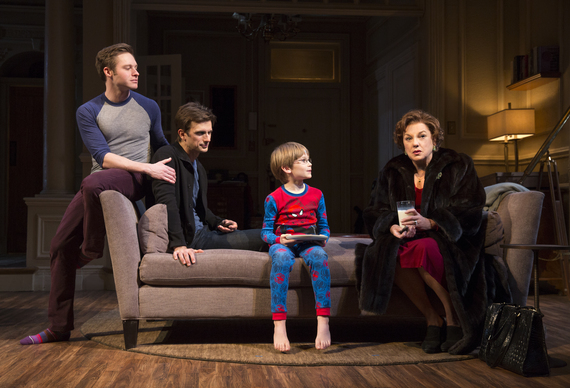HIV/AIDS, like any other life-threatening disease, does more than impact those who have it -- it ravages the lives of friends and family, too. Many movies, books and plays have explored this effect, but rarely years after the fact. Not surprising too, as that's when these other victims of the disease have often found the strength to rebuild their lives and continue, despite their loss.
However, that is exactly the premise of Terrence McNally's, Mothers and Sons, which was nominated earlier this month for the Tony Award for Best Play. Starring Tyne Daly, it presents Katherine, Andre's mother, who unexpectedly shows up at Andre's ex-partner's home during a visit to New York City (Andre died of AIDS). "Icy" to say the least, Katherine finds Cal with a new life, husband and son.
(Production Photo, Broadway's "Mothers and Sons," Starring Tyne Daly)
Essentially, what Mothers and Sons asks is not just how do we move on, but how have we done so as a country, since the peak of the AIDS crisis.
It's personal too, as my partner and I prepare to get married, and I often think what life would have been like for one of my best friends, who was infected with HIV and committed suicide. I often wonder what he would have been like now, 10 years later, and if we would be celebrating similar milestones in each other's lives.
What struck me most is that Mothers and Sons reminds us HIV/AIDS is not "then," it is "now." In fact, it may arguably be as much "now," as it has been for the last decade and more, its appearance has just changed.
"Mothers and Sons" helped me realize four important elements to the ongoing battle against HIV/AIDS:
•The first is continuing to cope with the passing of our loved ones, while also honoring their memory, by never giving up the fight;
•Second, is realizing that people do in fact change and evolve. We must learn to forgive family and friends who were unable, or unwilling at the time, to cope with the disease that so unfairly took the lives of our loved ones;
•Third, is remembering that we've not yet found a cure. We must continue to work rigorously for that resolution ensure education that promotes disease prevention, and lastly, treat, with utmost care and respect, those who are infected;
•Fourth, just as we push for education that supports prevention, so must we educate the younger generations about this disease. Not only to help further these efforts, but also to honor those who have passed, and ideally help learn from mistakes that once brushed aside the severity, and labeled HIV/AIDS as "gay cancer."
Photo Credit: Joan Marcus
No "spoiler alert" is needed when I say that Cal doesn't receive Katherine with open arms. However, within their chilliness is actually a small bit of warmth that give them solace and a sense of hope. They will never be friends, but in some twisted way, they are family -- by circumstance, if not by choice. Their love of Andre holds them together, and somewhere deep inside, with everything that is left unsaid, they cope.


